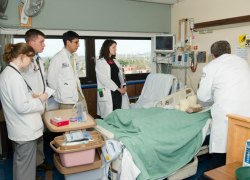Education

Our faculty are enthusiastic teachers. We are proud of our rich tradition in training residents and now offer a unique integrated child and adolescent residency training program emphasizing family-based pediatric psychiatry and research. A culture
of curiosity and learning is evident in all our academic activities, from core medical student rotations to departmental conferences to resident seminars. We expect our residents to learn and to teach, which in turn enhances their professional
development.
Medical Student Education
The Department is engaged in all aspects of medical student education across the Vermont Integrated Curriculum.
Foundations
Members of our department are involved in the Introduction to Clinical Decision Making course, the Generations course, the Medical Student Leadership Groups, Professionalism, Communication & Reflections course, and individual student advising
and mentoring.
Neural Science Course
This multidisciplinary Foundations course integrates basic science and clinical topics, is given in the spring of the first year of medical school, and has consistently been highly ranked by the medical students. As part of the course, students perform
mental status examinations, and interview standardized patients.
Psychiatry Clerkship
The six-week clerkship improves the understanding of psychiatric illnesses and their management. Students recognize the signs and symptoms of psychiatric disorders, and the acute phase of response to pharmacological and psychotherapeutic interventions
in largely inpatient, and some outpatient, settings. Through the lecture series and clinical teaching, students will develop knowledge of the etiology and pathogenesis of psychiatric illnesses and gain understanding of the indications for, mechanisms
of action of, and potential adverse effects of a variety of treatments for psychiatric disorders. Students will develop empathy for those suffering with mental illnesses and knowledge of the role that psychiatric conditions play in clinical practices
in all specialties.
Advanced Integration Rotations
During the last fourteen months of medical school, students may choose rotations in inpatient psychiatry (acting internship), consultation psychiatry, emergency psychiatry, child and adolescent psychiatry, geriatric psychiatry, outpatient psychiatry,
and/or psychiatric research.
Psychology Education
The University of Vermont Medical Center Department of Psychological Services provides training to predoctoral students and postgraduate fellows in clinical psychology with supervision and didactic training provided by licensed doctoral level clinical
psychologists.
Training is offered in the areas of:
- Adult Medical Psychology
- Rehabilitation Psychology
- Pediatric Medical Psychology
- Adult and Child Clinical Psychology
Medical students and residents in psychiatry and pediatrics may have opportunities to rotate through medical services served by the Department of Psychological Services.
Psychology training is also provided in the Department of Psychiatry at the Center for Children Youth and Families and at UVM in the doctoral program in Clinical Psychology in the College of Arts and Sciences.
Residency and Fellowships
The Department directs postgraduate medical education in psychiatry for residents. Both a general psychiatry residency and a child psychiatry fellowship are available. See Graduate Medical Education at
UVM/The University of Vermont Medical Center to learn more.
The Psychiatry Residency Program promotes individual attention to each resident’s learning and facilitates the building of lifelong professional friendships.
The department accepts five residents per year, two of whom participate in a combined five-year general/child and adolescent psychiatry fellowship program. All five residents function as a single group until the PGY-IV year when the two child track
residents begin full-time child psychiatry training.
Psychiatry Residency and Fellowship
Community Medical School
Designed to share the medical learning experience with our greater community, the Community Medical School is a series of weekly lectures held twice yearly. The topics are chosen for their relevance and presented by College of Medicine faculty experienced
with presenting scientific information in an engaging, easy-to-understand manner.
View a Community Medical School lecture by Terry Rabinowitz, M.D., Professor of Psychiatry and Family Medicine and Director, Psychiatric Consultation and Telemedicine Services, from April of 2012 titled "At Wit's End: Recognizing and Dealing with
Depression and Stress."